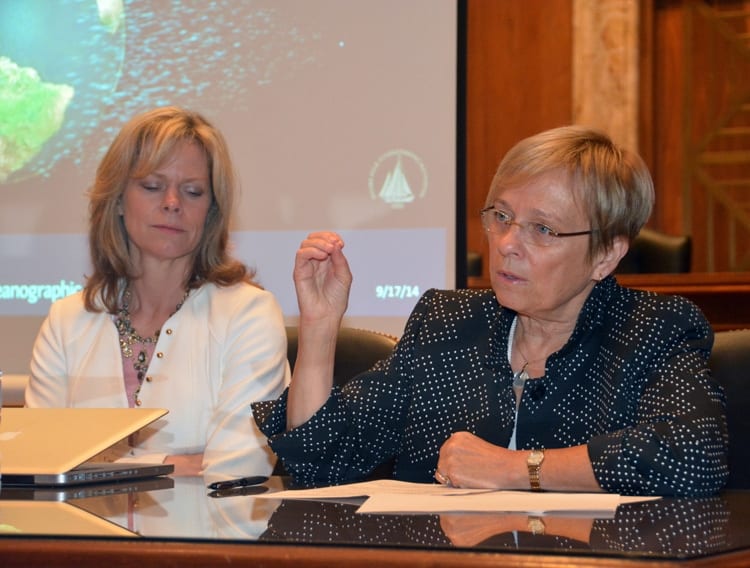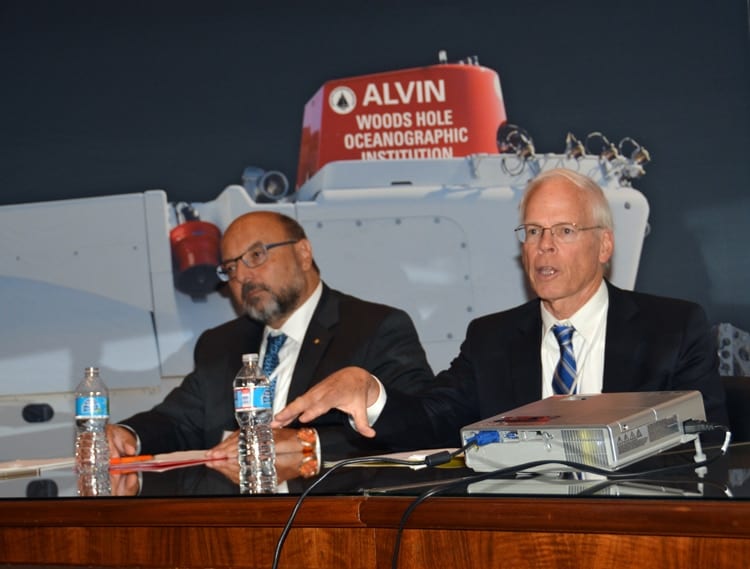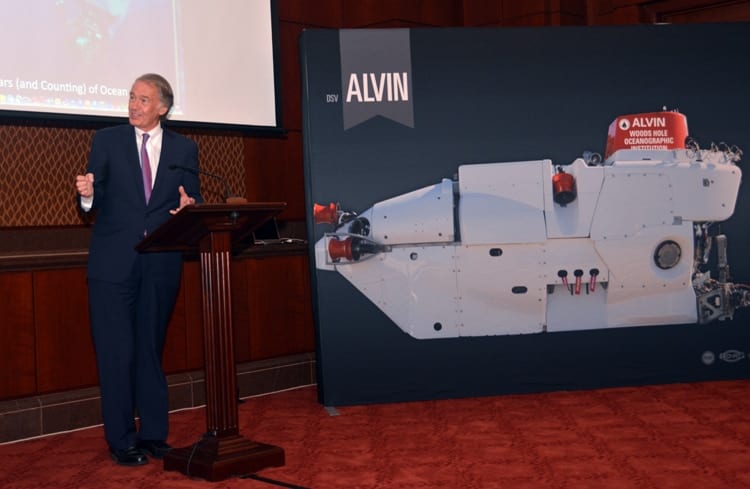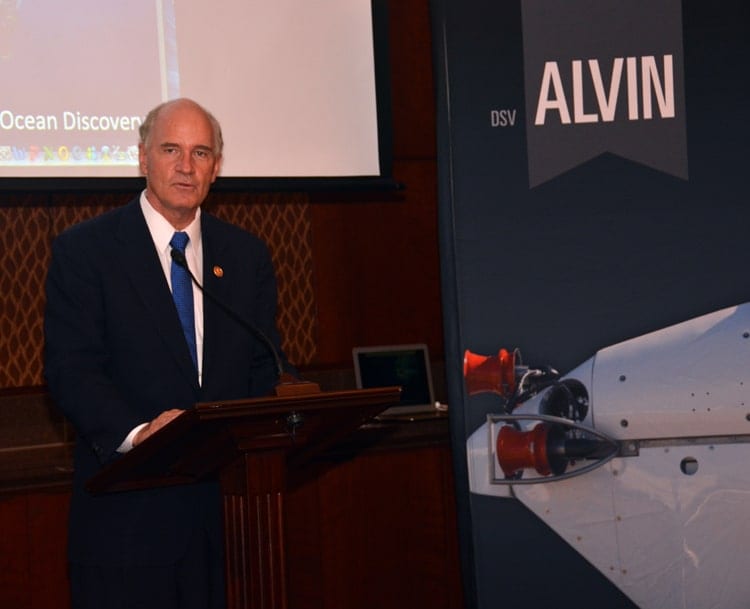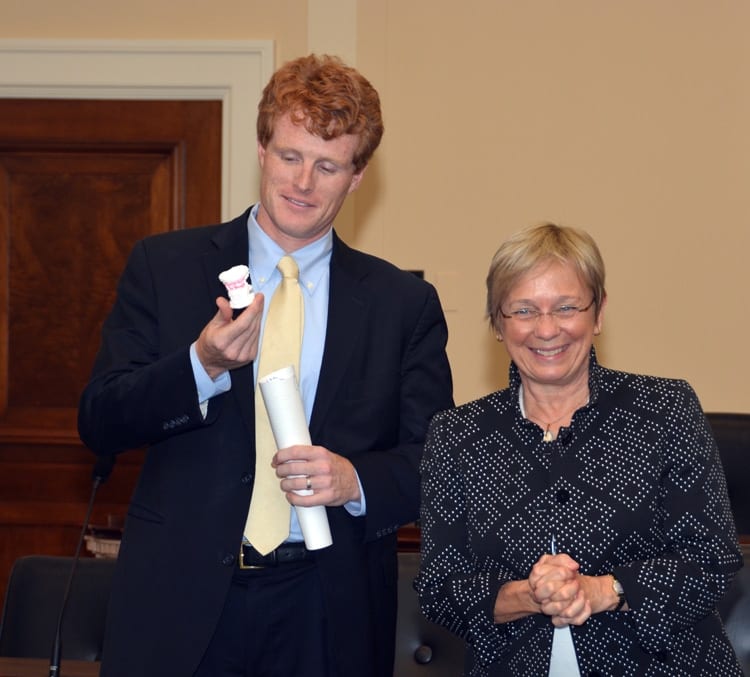Alvin 50th Celebration Highlights Essential Research
September 19, 2014
The human-occupied sub Alvin was the “guest of honor” this week at House and Senate staff briefings and a reception at the U.S. Capitol, commemorating 50 years of service as our nation’s deepest diving research submersible.
A contingent of scientists from Woods Hole Oceanographic Institution (WHOI), the developer and operator of the vehicle, were on Capitol Hill meeting with lawmakers and their staff about the value of ocean science research and engineering and its importance to our economy, health, welfare, and national competitiveness and security.
“We are here on Capitol Hill today to mark the 50th year of operations by the nation’s deep-diving research sub Alvin,” said WHOI President and Director Susan Avery. “But we are also here to raise awareness of a much broader issue: America’s need to invest in research and new technologies, including those that would help us explore the ocean and better understand the natural systems that make our planet livable and our society viable.”
Avery was joined by Executive Vice President Larry Madin, Ocean and Climate Change Institute Director Carol Anne Clayson, and Special Projects Director David Gallo. Together the WHOI scientists stressed that the ocean is vital to life on Earth, and that it is now changing rapidly in response to human activities, with consequences that are hard to determine without sufficient data. They underscored the need for a strong and sustained national commitment to understand how the ocean will affect human society in the coming century.
Key funders of this research are the National Science Foundation, the Navy’s Office of Naval Research, the National Oceanic and Atmospheric Administration and the National Aeronautics and Space Administration. Leaders from these agencies attended the reception in Alvin’s honor, along with agency and Hill staffers, and heard remarks honoring Alvin from Senator Ed Markey and Representative William Keating.
“Alvin is a national scientific treasure, and I am proud that it calls Massachusetts and the Woods Hole Oceanographic Institution home,” said Sen. Markey, who detailed Alvin’s contributions of historical and scientific significance in comments published in the Congressional Record. “Alvin’s long and extraordinary history is a testament to the importance of ocean research and exploration. In its first 50 years it has transformed our view of life, responded to national emergencies and inspired us all. I look forward to the remarkable discoveries it will make in its next 50 years.”
Rep. Keating underscored Sen. Markey’s comments and praised the contributions to ocean science exploration made by WHOI, which is located in his Congressional district. “As a country we take pride in the work this Institution has done. It is a Mecca for all of this important research,” he said.
In addition to Markey and Keating, the WHOI contingent’s activities in Washington, D.C., were supported by Rep. Eddie Bernice Johnson as well as Rep. Joseph Kennedy III, who made time during the House briefing to comment, “The work that you all do goes to answer some of the most profound questions that humanity has yet to find a solution to,” said Kennedy.
Alvin recently emerged from a major three-year, NSF-funded upgrade, which improved numerous operating systems and included a new personnel sphere rated to 6500 meters. Additional improvements are required in a Phase II upgrade to enable the sub to reach that increased depth.
“For 50 years Alvin has taken scientists to places no human has ever been, and enabled discoveries that have changed our understanding of life on this planet,” says Debbie Bronk, director of the National Science Foundation’s Division of Ocean Sciences, the largest supporter of Alvin operations. “NSF’s investment in making a bigger, better Alvin ensures that [it] will continue to enable great discoveries in the future.”
Throughout the day, Alvin’s accomplishments in its 50-year history were recounted along with its ongoing importance to the advancement of ocean sciences. “From discovering hydrothermal vents, to exploring RMS Titanic, to helping out with Deepwater Horizon, Alvin has been the U.S.’s go-to-guy for deep ocean research for decades,” said U.S. Senator Barbara A. Mikulski, Chairwoman of the Committee on Appropriations, which hosted the briefing for Senate staff. “More than half of U.S. economic growth can be attributed to innovation that began with basic research, and work in the deep ocean is no exception. Alvin has been a transformational building block for ocean engineering and ocean research – not only continuing to make new discoveries every year but also changing the way that scientists explore the ocean. Alvin is just as relevant to American competitiveness today as when it first dipped below the waves 50 years ago.”
Alvin is owned by the U.S. Navy and operated by the Woods Hole Oceanographic Institution as part of the National Deep Submergence Facility for the benefit of the entire U.S. oceanographic science community.
“Alvin’s contributions from finding the A-bomb off Palomares, Spain, to exploration of hydrothermal vents have been historic,” said Dr. Frank Herr, Office of Naval Research Director, Ocean Battlespace Sensing. “I am looking forward to Alvin’s new discoveries.”
As a celebration of Alvin’s accomplishments, the events in D.C. were as much an opportunity to look forward the next 50 years of ocean exploration and what it might hold.
“Today, we know the ocean is changing. It is warming; it is becoming more acid and there is an increase in regions that are starved of oxygen. It is becoming less oxygenated; it is losing sea ice; sea levels are rising; there are fewer fish in it; and it is becoming more polluted,” Avery said. “The future of the ocean is uncertain, which means our future is uncertain. It is up to us to reduce those uncertainties by expanding our scientific exploration of the ocean using the advances in observing and analysis —capabilities that are poised to help us learn about our changing ocean and our changing planet that sustains us.”
The Woods Hole Oceanographic Institution is a private, non-profit organization on Cape Cod, Mass., dedicated to marine research, engineering, and higher education. Established in 1930 on a recommendation from the National Academy of Sciences, its primary mission is to understand the ocean and its interaction with the Earth as a whole, and to communicate a basic understanding of the ocean’s role in the changing global environment. For more information, please visit www.whoi.edu.

